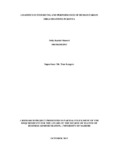| dc.description.abstract | The main objective of the study was to investigate the logistics outsourcing strategy and performance of humanitarian organisations in Kenya. The specific objectives of the study were to: determine the influence of human resource outsourcing on the performance of humanitarian organisations in Kenya, evaluate the extent to which information systems outsourcing impact on the performance of humanitarian organisations in Kenya and establish the influence of transport outsourcing on the performance of humanitarian organisations in Kenya. This research involved a cross sectional survey of the humanitarian organisations in Kenya. There are seventy (70) registered organizations that were actively involved in humanitarian work in Kenya Since the population was small there was no need for sampling rather the whole population of 70 acted as the sample population by use of census method. The researcher collected data from key supply chain personnel who include supply chain managers, officers or their equivalent. Primary data was collected using semi structured questionnaire. The research was both qualitative and quantitative in nature. The researcher employed multiple regression models to study the factors influencing performance of humanitarian organisations in Kenya. According to the findings assessments were done to bridge the gap between the organizations’ demand and supply level to a great extent (mean score 3.77). The study findings show that the organization uses flow of information as an important tool for communication between all its stakeholders to a great extent (mean score 3.73). Further through the majority (79%), the study found that they were in agreement that they outsourced transport. The study found that overall success on the mandate assigned was achieved to a great extent (mean score 4.01). The study concedes that HR outsourcing gives the organizations a competitive edge and brings profitability for the business overall. The study concludes that, the use of information systems outsourcing has benefits which the humanitarian organizations have adopted to a large extent and has improved their performance. The study further concludes that the firms were outsourcing transportation management. The firms opted to outsource this service due to the associated advantages and possible influence on organizational performance, thus enabling the firms to focus on their core competencies. The study recommends the creation of office of outsourcing management within the HR division. From the findings the study recommends that organizations need to identify the key areas within the information systems outsourcing that have the highest benefits and least challenges or negative impact on the performance. From the findings the study also recommends that humanitarian organizations should outsource these services by ensuring that information is handled with utmost care by ensuring there are high security measures not to disclose the organaisations information. The outsourcing practices being adopted by the humanitarian organizations resulted in increased productivity, organizational effectiveness, continuous improvement, improved quality and improved quality of work life and thus outsourcing of these processes was an ideal solution that helped to increase the organizations performance. | en_US |

